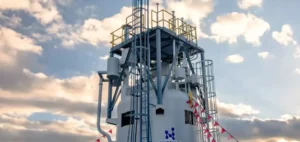On April 21, Energoatom President Petro Kotin signed a cooperation agreement with Holtec CEO Kris Singh in Kiev and Camden, USA. The ceremony was also attended by the Minister of Energy of Ukraine, Herman Galushchenko, and the Vice President of Holtec International’s operations in Ukraine, Riaz Avan.
According to Holtec, the cooperation agreement calls for the implementation of the first SMR-160 pilot project with the goal of achieving minimum controlled reactor power and grid connection by March 2029. The agreement also calls for the establishment of a joint project office to begin the work necessary to license and deploy Holtec’s SMR-160s throughout Ukraine, with a focus on abandoned coal production sites.
A self-sufficient SMR
Holtec’s SMR-160 is a 160 MWe factory-built plant that uses low-enriched uranium fuel. The reactor core and all components of the nuclear steam generation system would be located underground, and the design incorporates a multitude of features, including a passive cooling system capable of operating indefinitely after shutdown. No active components, such as pumps, are needed to operate the reactor, which does not require on-site or remote electricity to shut down and dissipate decay heat.
In March 2018, a memorandum of understanding was signed between Holtec and Energoatom, envisaging Ukraine’s adoption of Holtec’s SMR technology with the country becoming a manufacturing center for SMR-160 reactor components. The MOU included the licensing and construction of SMR-160 reactors in Ukraine, as well as the partial localization of SMR-160 components.
Manufacturing hub in Ukraine
The Ukrainian manufacturing hub is expected to mirror the capabilities of Holtec’s advanced manufacturing facility in Camden, and will be one of four manufacturing facilities Holtec plans to build in locations around the world by the mid-2020s. In June 2019, Holtec, Energoatom, and the State Scientific and Technological Center of Ukraine formally entered into a partnership to advance the SMR-160 for deployment in Ukraine.
The partners ratified the creation of a consortium partnership that linked the three companies in a cooperative venture to advance the deployment of the SMR-160 small modular reactor in the country. The consortium is a U.S. company registered in Delaware, with each of the three parties owning allocated shares. Its technology operations center will be based in Kiev, Ukraine.






















